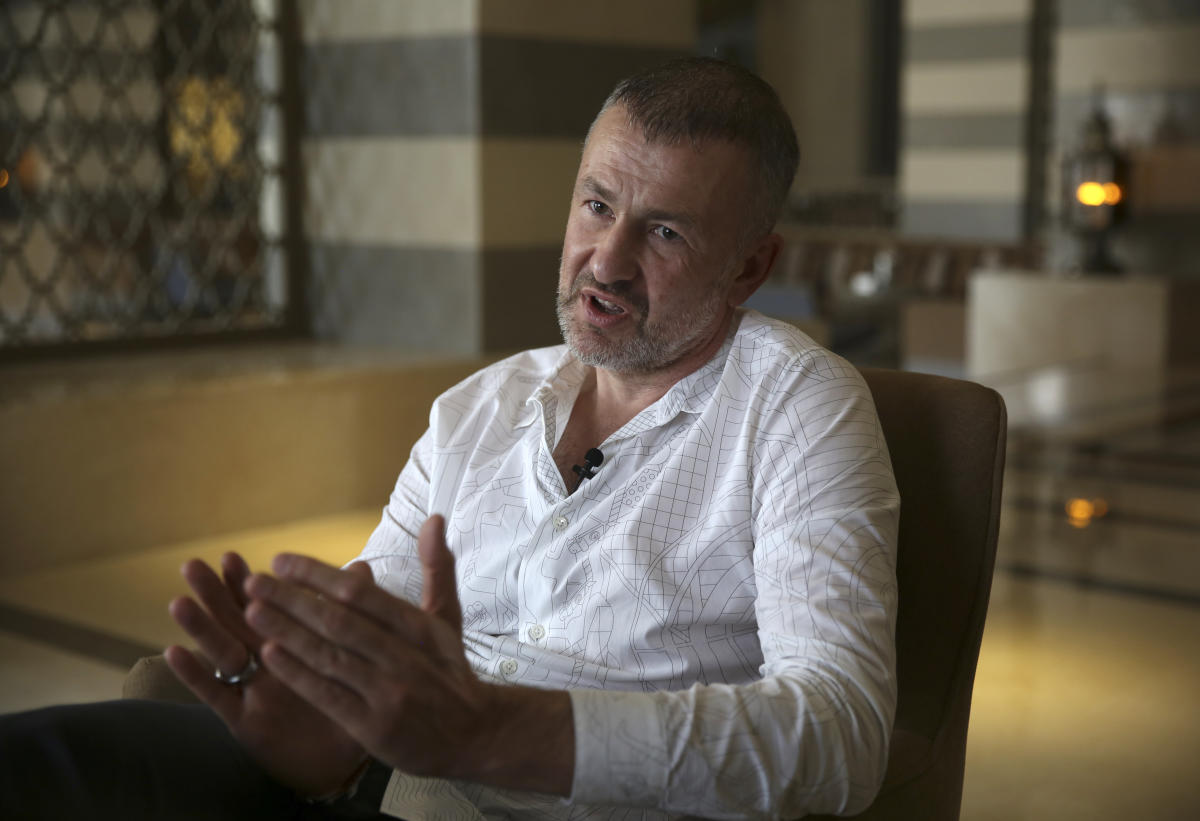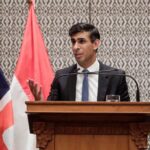
SHARM EL-SHEIKH, Egypt (AP) — A Russian billionaire under sanctions by the United States and Europe over his alleged ties to the Kremlin said Wednesday that he was not surprised by protests against his country at this year’s U.N. climate talks, but insisted that Russia wants to remain engaged on the issue of global warming because it deeply affects the nation.
Andrey Melnichenko, who heads the climate policy panel of Russian business lobby group RSPP, told The Associated Press that “regardless of the very terrible moment which we all experience now, we will participate, we will observe” at the meeting in Sharm el-Sheikh, Egypt.
Pro-Ukraine activists disrupted the start of an event hosted by the Russian delegation at the climate talks Tuesday before being escorted out by security staff.
“I wasn’t surprised,” said Melnichenko, who was speaking on the panel alongside Russian delegates. “What’s so surprising? That there are people who are deeply concerned about what’s happening in Ukraine and want to make their opinion known?”
“I completely 100% understand that,” he said.
His comments, while not directly critical of Russia’s invasion of Ukraine, indicate a more nuanced view of the bloody conflict than the official Kremlin line, which describes the war as a “special military operation.”
Since late February the war has devastated Ukraine, with bombs and shelling decimating towns and cities and killing thousands.
The war has resulted in a raft of sanctions being imposed on Russian officials and prominent businesspeople linked to the Kremlin.
Melnichenko — who now lives in Dubai — criticized Western sanctions on Russia, which he said were applied without regard for possible consequences, such as the effect restrictions on fertilizer exports would have on global food prices and Russia’s efforts to cut greenhouse gas emissions. Russia is the world’s largest exporter of fertilizers.
“Sanctions were put like a blanket on the Russian economy,” said Melnichenko, who once ran the fertilizer producer Eurochem and SUEK, one the the world’s largest coal companies. “It affects everything. Take for example food and fertilizer supply.”
He claimed the sanctions had affected food supply for “hundreds of millions” of people worldwide.
“Of course, this decision affects Russia’s possibility to move faster on the way of the decarbonization of its economy,” added Melnichenko.
Russian participants at the climate talks in Egypt have kept a low public profile, with no top government officials attending. Although the Russian delegation is half the size of last year’s, it is still larger than that of the United States, according to an analysis by Carbon Brief.
According to Melnichenko, Russia is? particularly focused on efforts to reduce emissions and reliance on fossil fuels, along with rules for international carbon markets and carbon offsets — an issue where the Russian government sees great potential due to the country’s huge forests.
Melnichenko said that Russia will continue to export fossil fuels to fulfill demand, and it should be left to markets to decide which forms of energy are the most competitive. Russia is a top exporter of oil and natural gas although it has faced sanctions from EU trading partners. Other countries, like India and China, continue to import Russian oil.
“I believe that Russia’s fossil fuel production (is) very competitive globally in terms of the total cost, externalities included,” he said. “That’s why Russia will be able for a reasonably long period of time, a very long period of time, to maintain quite (a) big share of the fossil fuel market and … benefit from it also.”
Melnichenko, who according to Forbes is worth some $23.5 billion, said the world community should pay more attention to the large share of greenhouse gas emissions that aren’t caused by human activity, such as respiration, decomposition and even volcanoes. Scientists say the global warming measured in recent decades is mainly caused by the large-scale burning of fossil fuels since industrialization.
Asked what role concerns about climate change play in Russian civil society, he said that environmental issues such as air pollution had become more prominent in bigger cities over the past six to seven years
Peaceful protests on the issue were possible, he insisted. “And the government really responds.”
“That’s one of the area where you can have freedom of expression,” he said. “And that’s understandable because it’s pretty safe in terms of the political environment.”
___
Follow AP’s climate and environment coverage at https://apnews.com/hub/climate-and-environment
___
Associated Press climate and environmental coverage receives support from several private foundations. See more about AP’s climate initiative here. The AP is solely responsible for all content.




